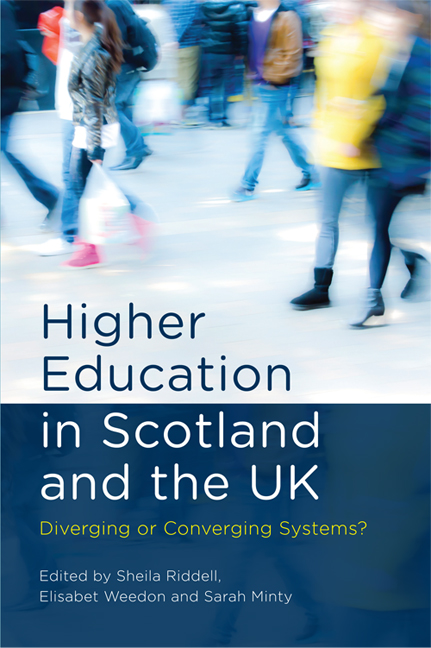Book contents
- Frontmatter
- Contents
- Figures
- Tables
- Acknowledgement
- The Contributors
- Dedication
- 1 Scottish Higher Education and Devolution
- 2 Higher Education Governance and Institutional Autonomy in the Post-devolution UK
- 3 Student Funding in the UK: Post-Devolution Scotland in a UK Context
- 4 Young People–s Attitudes towards Student Debt in Scotland and England
- 5 Cross-border Flows of Students within the UK
- 6 Widening Access to Higher Education in Scotland, the UK and Europe
- 7 The Internationalisation of Higher Education in Scotland and the UK
- 8 Research Policy in Scotland and the Rest of the UK
- 9 Devolution and Higher Education Policy: Negotiating UK and International Boundaries
- Appendix 1 Research Methods
- Appendix 2 List of Acronyms
- Index
6 - Widening Access to Higher Education in Scotland, the UK and Europe
Published online by Cambridge University Press: 05 August 2016
- Frontmatter
- Contents
- Figures
- Tables
- Acknowledgement
- The Contributors
- Dedication
- 1 Scottish Higher Education and Devolution
- 2 Higher Education Governance and Institutional Autonomy in the Post-devolution UK
- 3 Student Funding in the UK: Post-Devolution Scotland in a UK Context
- 4 Young People–s Attitudes towards Student Debt in Scotland and England
- 5 Cross-border Flows of Students within the UK
- 6 Widening Access to Higher Education in Scotland, the UK and Europe
- 7 The Internationalisation of Higher Education in Scotland and the UK
- 8 Research Policy in Scotland and the Rest of the UK
- 9 Devolution and Higher Education Policy: Negotiating UK and International Boundaries
- Appendix 1 Research Methods
- Appendix 2 List of Acronyms
- Index
Summary
INTRODUCTION
Despite the massification of higher education from the 1980s onwards, the Dearing and Garrick Reports published in 1997 expressed concerns over the under-representation in higher education of certain social groups (National Committee of Inquiry into Higher Education, 1997a, 1997b). This prompted the development of a range of measures to encourage wider participation, including work with school pupils from non-traditional backgrounds. In Scotland, better use of articulation between further and higher education was advocated in the Garrick Report as one way of promoting higher levels of university participation (National Committee of Inquiry into Higher Education, 1997b). Although widening participation emerged as an issue somewhat later across Europe it is now promoted by the social dimension in the Bologna Process (see, for example, Eurydice, 2014).
This chapter examines strategies to promote widening access across the four nations of the UK, with the main focus on Scotland and England. A central question is whether, in the light of devolution, widening access is an area characterised by a greater degree of convergence or divergence (Gallacher and Raffe, 2012). In line with the goals of the Bologna Process, it is also interesting to consider whether within the EU there is evidence of higher education convergence across EU member states and other countries within the European Higher Education Area. These issues are explored using administrative data from the Scottish Funding Council (SFC), the Higher Education Statistics Agency (HESA), Eurostat and the Eurostudent survey. In addition, we also draw on data from interviews with key informants which were conducted as part of the ESRC project. The following questions are addressed:
• What are the main strategies for promoting widening access to higher education by non-traditional students and what monitoring is in place in different parts of the UK? Has devolution led to greater convergence or divergence across the UK in the field of widening access?
• What measures are in place in Europe to promote widening access and how is progress monitored?
• What evidence is there of an increase in students from non-traditional backgrounds in the UK, Sweden and Germany and what similarities and differences are evident across these three member states?
- Type
- Chapter
- Information
- Higher Education in Scotland and the UKDiverging or Converging Systems?, pp. 90 - 109Publisher: Edinburgh University PressPrint publication year: 2015



